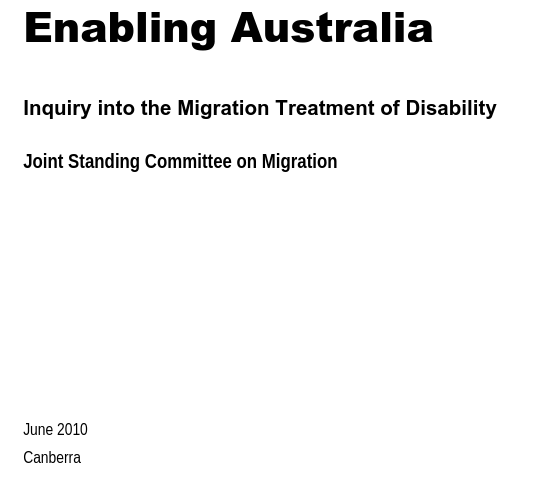
Sherlock v Australia (CRPD, 2021)
Violations: CRPD art 4(1), CRPD art 5(1), CRPD art 5(2), CRPD art 18(1)
 Partially remedied
Partially remedied
The UN says:
CRPD (2021)(a) Concerning the author, [Australia] is under an obligation to provide her with an effective remedy, including reimbursement of any legal costs incurred by her and compensation;
(b) In general, [Australia] is under an obligation to take measures to prevent similar violations in the future. In this regard, the Committee requires [Australia] to ensure that barriers to the enjoyment by persons with disabilities of the right to utilize the immigration proceedings on an equal basis with others are removed under national legislation.
As [Australia’s] law does not prohibit any private arrangements between an employee and his or her employer concerning the payment or reimbursement of health-care costs, the Committee recommends that such arrangements be part of the visa criteria and thus be taken into consideration.

A monoclonal antibody used to treat multiple sclerosis (image: Medpage Today)
Gráinne Sherlock, an Irish national, was a senior executive at the Dublin office of a multinational software company. She was diagnosed with multiple sclerosis (MS) in 2001, which was treated effectively with a monthly intravenous infusion, allowing her to remain ‘fit, healthy and symtom-free’.
In June 2012, she applied successfully for a transfer to her employer’s Melbourne office in Australia. She then applied for a temporary work (skilled) visa (subclass 457 visa) sponsored by her employer. Australia’s Immigration Department deemed that Ms Sherlock failed the health requirements for the visa, as the cost of her treatment for MS over 4 years was estimated at $97,000, which exceeded the ‘significant cost threshold’ of $35,0000 that Medicare would cover for pre-existing health conditions. Although she was personally willing to cover any uninsured treatment costs, the Department said this private agreement was not permitted under Australian law. Consequently, Ms Sherlock’s employer in Australia declined to sponsor her visa and she was no longer eligible for the position.
In 2014, Ms Sherlock petitioned the UN Committee on the Rights of Persons with Disabilities claiming Australia had violated her rights under article 4(1)(a)-(e) (discrimination on the basis of disability), article 5(1)-(2) (equality before the law without discrimination) and article 18(1) (liberty of movement) of the Convention on the Rights of Persons with Disabilities (CRPD).
The Committee concluded that Ms Sherlock’s visa was rejected solely on the basis of her MS, and that the Migration Act health requirement disproportionately affected the author as a person with disabilities, resulting in indirect discrimination. The Committee also found that the Migration Regulations 1994 impaired the Ms Sherlock’s right to use immigration proceedings on an equal basis with others, in violation of articles 4(1)(a)-(e) and 5(1)-(2), read alone and in conjunction with article 18(1) of the CRPD.
The Committee ordered Australia to provide individual remedies and take non-repetition measures and report back to the Committee within 6 months.
Australia disagreed with the Committee’s findings and declined to implement its recommendations. It held that Ms Sherlock was not within Australia’s jurisdiction for the purpose of the Convention (para. 50). By this logic, Australia cannot breach any human rights in the issuing of visas if the applicant is abroad.
Australia advised the Committee that it had replaced its subclass 457 visa with a new temporary working visa: the Temporary Skill Shortage (subclass 482) visa, which allows the Minister to waive the health requirements if the applicant satisfies all other criteria for the skills shortage visa. Also, Australia no longer requires sponsoring employers to undertake to meet costs related to the disease or condition which caused the applicant to fail the health requirement in order for the Minister to be able to waive the requirement.
Australia's Interpretive Declaration
Australia has declared its own interpretation of the CRPD (which it ratified in 2008), namely that:
"the Convention does not create a right for a person to enter or remain in a country of which he or she is not a national, nor impact on Australia's health requirements for non-nationals seeking to enter or remain in Australia, where these requirements are based on legitimate, objective and reasonable criteria."
In 2013, the UN Committee on the Rights of Persons with Disabilities asked Australia to withdraw this Interpretative Declaration to article 18. Australia has refused, and the declaration remains on the Department of the Attorney-General's website.
Women with Disabilities Australia noted in 2019 that in practice:
"People with disability, and families who have members with disability, consistently have their visa applications denied because they are unable to meet the strict health requirement under the Migration Act... It is extremely difficult for children and adults with disability to meet the health requirement, given the focus is exclusively on the perceived economic cost of the applicant’s ‘condition’ [without] recognition of the economic, social and cultural contributions of people with disability and their families."The only recourse for people with disability, and families who have members with disability, is to seek Ministerial intervention. This relies on significant lobbying, public pressure and petitioning to achieve, and often does not result in a fair outcome.
"While the health requirement does not, on face, discriminate against persons with a disability, the provisions indirectly discriminate against people with disability. [Australia's] Joint Standing Committee on Migration’s Inquiry into the Migration Treatment of Disability in 2010 stated that the health requirement is discriminatory...
"The discriminatory effect of the health requirement on migrants and refugees with disability has also been noted by the UN Special Rapporteur on the Human Rights of Migrants [in 2017]."
Read Australia’s response to Sherlock v Australia
Read the full decision: Sherlock v Australia (March 2021)

A parliamentary inquiry made 18 recommendations to the Australian Government in 2010. Two concerned skilled migration for disabled people.